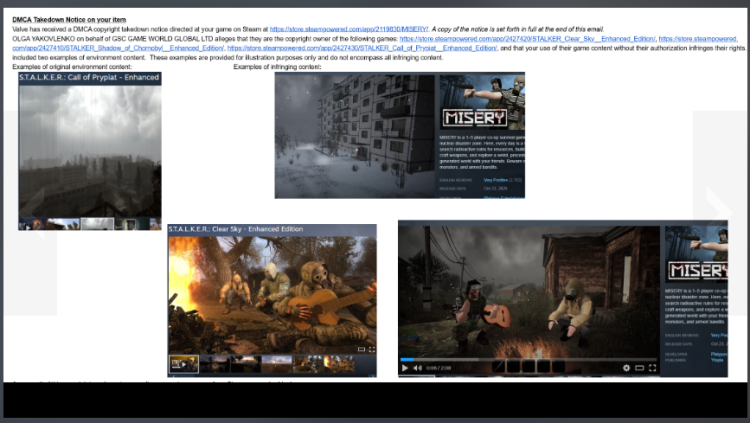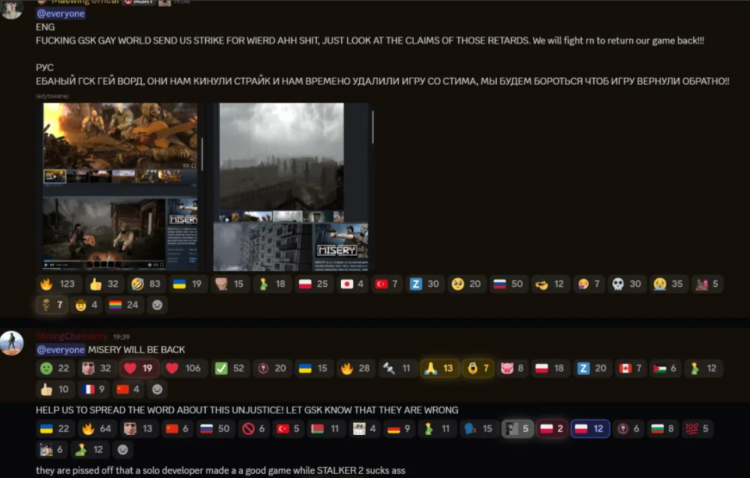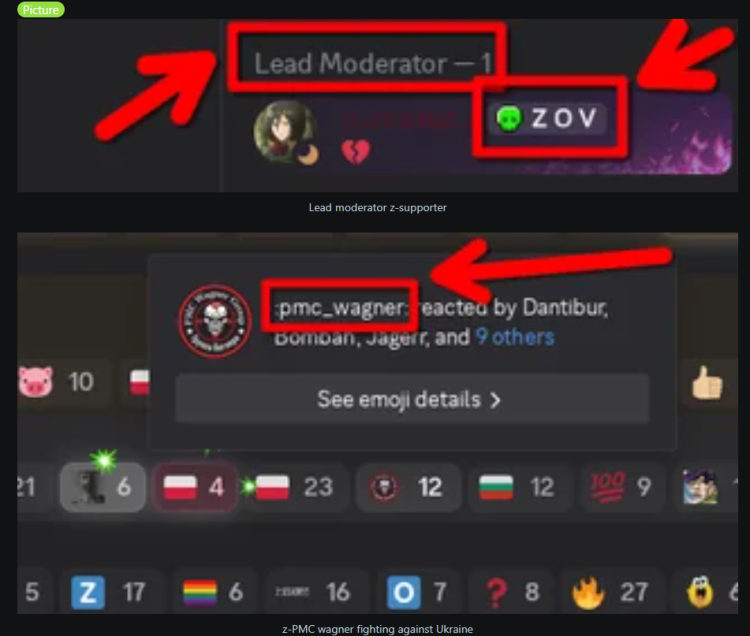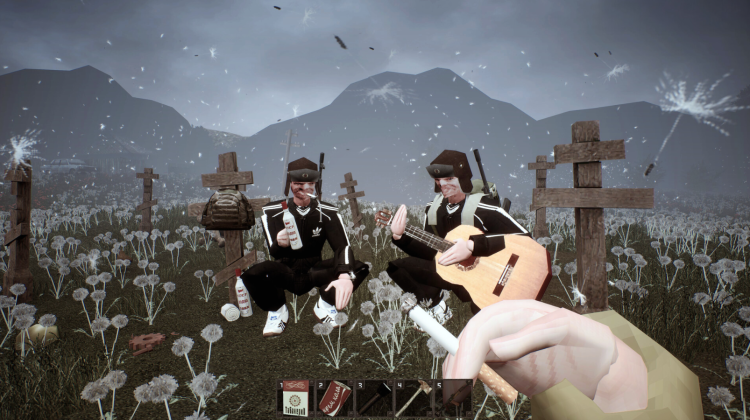GSC Game World’s DMCA Takes Down Misery From Steam, Fueling a Clash Over Inspiration and Ownership
The independent survival shooter Misery has been removed from Steam after GSC Game World, developer of the S.T.A.L.K.E.R. series, filed a DMCA complaint alleging unauthorized use of its content. The takedown, delivered through Valve, triggered a wave of anger and confusion across the game’s community and within indie circles, raising questions about how much influence inspiration can legally—or ethically—draw from another studio’s work.
The delisting was first revealed in a post on Misery’s official Steam community page, written by its 19-year-old developer, who goes by Maewing. The message, titled “We are under attack!”, opened with an image of a crying cat and a statement that the game had been “delisted following a DMCA strike initiated by GSC Game World.” Attached was Valve’s notice, showing screenshots used by GSC to illustrate its complaint—side-by-side images of campfires, scavenged gear, and gas-masked survivors.
Valve’s correspondence cited “use of game content without authorization,” though the screenshots offered little evidence of direct asset reuse. Both games share a post-Soviet survival aesthetic—muted palettes, irradiated ruins, and cold forests—but no identical textures or models were visible in the examples provided. The resemblance lies in atmosphere and framing rather than code or material assets.

Misery's Steam community blog post argues that the claim “goes off vibes more than anything.” The developer wrote:
“We do not pose any threat to GSC or their IP, we do not compete with their games, nor do we use any of their IP. Misery was inspired by many things, including games, movies, and books, but filing a DMCA strike for that is wrong.”
The statement continued by pointing out that the S.T.A.L.K.E.R. series itself drew heavily from the Strugatsky brothers’ novel Roadside Picnic and Andrei Tarkovsky’s 1979 film Stalker, both of which defined the Zone’s atmosphere decades before GSC’s games.
The post further insisted that Misery contained no borrowed content:
“Misery uses no characters, plot, storyline, assets, monsters, music, code, etc., from their games. It is all either originally created or legally licensed.”
The developer closed with a pointed statement accusing the Ukrainian studio of corporate overreach:
“We also think that this is an abuse of power against small independent developers by a large corporation, and it should not be a thing.”
While that message took a measured tone, other reactions were less restrained. On the game’s Discord, Maewing reportedly vented frustration in harsher language, a post that Reddit user AcceptableAttitude13 posted a screenshot of on the S.T.A.L.K.E.R. subreddit. The message mocked “GSK Game World” and included a slur before vowing to “fight to return our game back.” The post was later edited, with an apology replacing the outburst.

In a follow-up statement, Maewing addressed the controversy surrounding those comments directly.
“Some people found my old posts and comments that included inappropriate and offensive statements,” he wrote. “Many are rightfully upset, and I completely understand why. What I wrote was immature, thoughtless, and wrong. It does not represent who I am today or what I believe in, and I deeply regret posting it.” He continued by affirming that the studio “does not support any form of extremism, violence, or discrimination,” and promised that the DMCA would be handled “calmly and professionally.”
The apology did little to slow speculation on Reddit and Discord, where some users suggested that the takedown might be linked not to visual similarity but to alleged political leanings in Misery’s community. A thread on the S.T.A.L.K.E.R. subreddit collected screenshots from the Misery Discord, including posts referencing pro-Russian symbols. None of these claims has been substantiated, and there is no confirmation that they influenced GSC’s decision to file the complaint. Still, the controversy was enough for Misery’s moderators to begin deleting older posts and enforcing new rules banning political imagery or nationalist slogans.
A pinned message from Maewing now reads:
“If someone spams Z’s or ZOV or any Ukrainian symbolic, swastics and so on in reactions or messages, just ban him without hesitation.”
The cleanup suggests a studio attempting damage control amid intensifying scrutiny. Whether the moderation changes relate to the DMCA dispute remains unclear, but the optics of nationalism and intellectual property entangling in a gaming conflict have not gone unnoticed.

On legal grounds, DMCA complaints hinge on demonstrable reuse of copyrighted material—models, sound assets, or code—not thematic resemblance. That distinction has fueled criticism of GSC’s action, especially given the broader influence of S.T.A.L.K.E.R. on the survival-shooter genre. The claim’s thin visual evidence, as shared by Misery, has led some to interpret the strike as an attempt to control aesthetic lineage rather than protect literal assets.
For GSC Game World, the move comes during an active development cycle for S.T.A.L.K.E.R. 2: Heart of Chornobyl, a project already delayed by war and technical setbacks. The studio has faced harassment and leaks throughout 2024 and 2025, including theft of development materials by pro-Russian groups. In that context, GSC’s sensitivity to imitation or perceived appropriation could be heightened, though the company has not yet issued a public statement explaining its reasoning.
For the indie scene, the Misery incident echoes a larger anxiety about how major developers wield copyright to suppress smaller projects that inhabit similar creative territory. Misery’s removal underscores how easily an unverified claim can erase months of visibility on a platform as dominant as Steam. Even if Valve reinstates the game after review, the episode demonstrates the asymmetry between corporate and independent power in digital publishing.

Image: MISERY screenshot from the official Steam page
As the situation develops, both studios face reputational challenges. GSC must justify its strike or risk alienating a community that has long embraced modding and derivative works. Misery, meanwhile, must repair its public image after its developer’s outburst and unverified Discord allegations. The intersection of legal procedure, fan identity, and geopolitics has turned what began as a copyright dispute into a cautionary episode about how fragile visibility can be in the Steam ecosystem.
Whether Misery returns to the storefront may depend less on the DMCA’s outcome than on how both sides navigate the fallout. For now, the game’s store page remains inaccessible, and the debate over creative ownership in the shadow of S.T.A.L.K.E.R. continues to expand across forums, legal circles, and modding communities alike.
Read also, GSC Game World’s roadmap for S.T.A.L.K.E.R. 2: Heart of Chornobyl outlines major 2025 updates, including a migration to Unreal Engine 5.5.4, upgraded modding tools, and the game’s long-awaited launch on PlayStation 5 and PS5 Pro. The plan aims to improve performance and expand content throughout the year, though the developers warn that the engine switch may shift their schedule.

Comments